
The role of tribal governments in Indian Territory came to an end in 1907 when Oklahoma entered the union as the 46th state. As a result, our Chickasaw people were granted United States citizenship. From that point until 1971, the president of the United States appointed the representative of the Chickasaw Nation. Douglas H. Johnston, born the same year we established the 1856 government, was the first man to serve in this capacity. Governor Johnston served the Chickasaw Nation from 1906 until his death in 1939 at age 83. He faced many difficult challenges in the first part of the 20th century, but held the tribe together.
It appeared to the federal government they had finally achieved their goal of assimilating our Chickasaw people into the national mainstream. However, year after year, Chickasaws continued to gather together socially and in our churches in a belief that community involvement and support would sustain us. Our Chickasaw language was spoken, and we continued to practice traditional activities whenever and wherever possible. Soon a grassroots movement for Chickasaw people to govern themselves began to grow.
During a time that civil rights issues gripped the rest of the country, a group of Chickasaws met at Seeley Chapel, a small country church near Connerville, Oklahoma, to work toward the reestablishment of our government. After the passing of Public Law 91-495, tribal government was finally realized. In 1971, the first tribal election since 1904 was held, resulting in Overton James’ landslide victory as governor of the Chickasaw Nation. Great change had finally arrived, yet our Chickasaw people sustained many core beliefs.
Women still took their place as matriarchs within their families. Elder members of the tribe were still held in high regard for their knowledge and experience. We still believed that war was sometimes necessary, and our Chickasaw warriors stepped forth in defense of their country during the American Revolution, the War of 1812, the Civil War, World War I, World War II, the Korean conflict, Vietnam, Afghanistan and Iraq. As always, Chickasaw communities came together to support one another for the greater good.